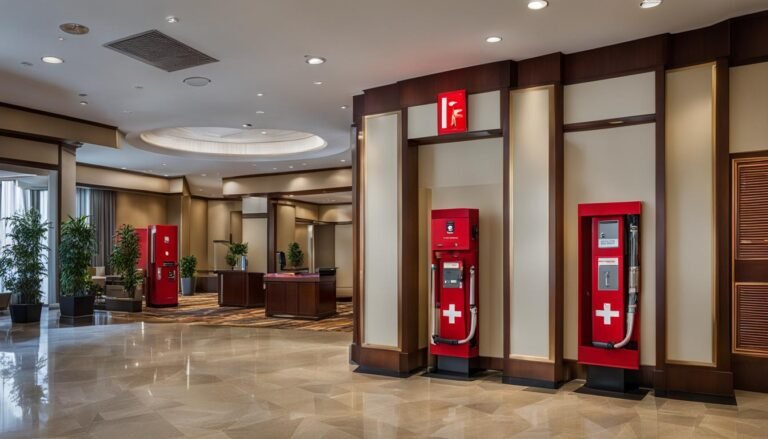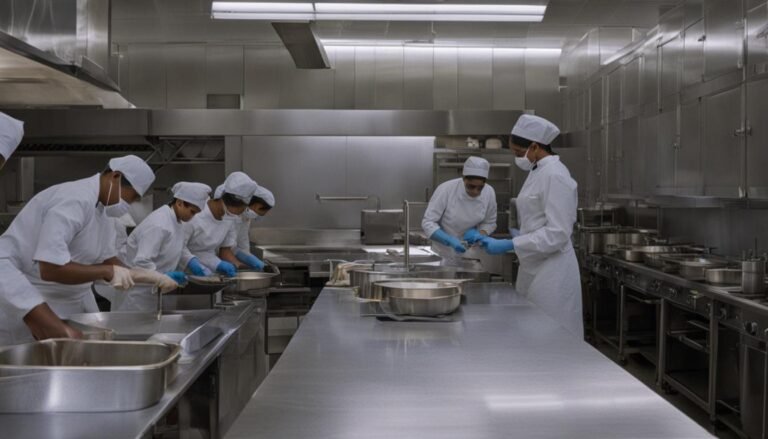Unveiling the Importance of Regular Health Inspections in Hospitality
Welcome to our blog, where we dive into the world of hospitality and shed light on the crucial role that regular health inspections play in ensuring the safety and satisfaction of both guests and establishments. Health and safety regulations and food safety standards are at the forefront of every successful hospitality business, and adhering to them is essential for maintaining a high level of hygiene and cleanliness. In this article, we will explore why regular health inspections are an integral part of the hospitality industry and how they contribute to the overall success and well-being of establishments.
Key Takeaways:
- Regular health inspections are crucial for compliance with health and safety regulations and food safety standards in the hospitality industry.
- These inspections help prevent potential risks and maintain cleanliness and hygiene in establishments.
- Ensuring compliance with health codes and regulations is essential for protecting the establishment’s reputation and reducing potential risks.
- Health inspections play a significant role in preventing foodborne illnesses and ensuring the safety of guests.
- Maintaining high cleanliness and hygiene standards is essential for the health and well-being of guests.
Ensuring Compliance with Health Codes and Regulations
Compliance with health codes and regulations is a crucial aspect of running a successful hospitality establishment. By adhering to these guidelines, hotels and restaurants prioritize the safety and well-being of their guests, while also maintaining a positive reputation in the industry. Regular health inspections play a vital role in ensuring compliance and identifying any areas where improvement is needed.
During health inspections, establishments are evaluated based on their adherence to specific health codes and regulations. This includes factors such as cleanliness, food handling procedures, sanitation practices, and employee hygiene. Inspectors identify any non-compliance issues and provide recommendations for rectifying them. By addressing these issues promptly, establishments can minimize potential risks and maintain a safe environment for their guests.
Furthermore, compliance with health codes and regulations goes beyond the safety of guests. It also impacts the overall reputation and success of the establishment. Positive inspection results demonstrate a commitment to high standards and can lead to increased customer trust and loyalty. On the other hand, repeated non-compliance can result in fines, legal issues, and damage to the establishment’s reputation. Therefore, regular health inspections are essential for ensuring compliance, minimizing risks, and protecting the reputation of hospitality establishments.
| Benefits of Ensuring Compliance with Health Codes and Regulations |
|---|
| 1. Safety and well-being of guests |
| 2. Protection of establishment’s reputation |
| 3. Increased customer trust and loyalty |
| 4. Minimized potential risks |
Overall, compliance with health codes and regulations is a critical responsibility for hospitality establishments. Regular health inspections help ensure that these establishments meet the necessary standards and provide a safe and enjoyable experience for their guests. By prioritizing compliance, establishments can protect their reputation, gain customer trust, and contribute to the overall success of the hospitality industry.
Preventing Foodborne Illnesses and Ensuring Guest Safety
Health inspections play a critical role in preventing foodborne illnesses and ensuring the safety of guests in hospitality establishments. These inspections are designed to identify and address potential hazards related to food handling, storage, and preparation techniques. By thoroughly inspecting the facilities, equipment, and practices in the establishment, health inspectors can help mitigate the risk of foodborne illnesses and create a safe environment for guests.
During health inspections, inspectors follow specific guidelines and regulations to assess the compliance of hospitality establishments with food safety standards. They examine the cleanliness and sanitation practices in the kitchen, including the proper storage and labeling of perishable foods, as well as the overall hygiene of the food preparation area.
Inspectors also evaluate the implementation of proper food handling practices, such as adequate cooking temperatures, avoiding cross-contamination, and maintaining proper hygiene practices. By identifying any potential non-compliance issues, health inspections provide establishments with valuable feedback and insights to improve their food safety protocols and prevent foodborne illnesses.
| Benefits of Health Inspections in Preventing Foodborne Illnesses and Ensuring Guest Safety |
|---|
| 1. Identification of potential hazards: Health inspections help identify potential hazards related to food handling, storage, and preparation techniques. |
| 2. Compliance with food safety standards: Health inspections ensure that hospitality establishments comply with food safety standards and regulations. |
| 3. Prevention of foodborne illnesses: By addressing non-compliance issues and implementing preventive measures, health inspections help prevent foodborne illnesses. |
| 4. Guest safety: Health inspections contribute to creating a safe environment for guests by ensuring proper food handling, storage, and preparation techniques. |
Key Takeaways:
- Health inspections are crucial in preventing foodborne illnesses and ensuring the safety of guests in hospitality establishments.
- Inspectors assess compliance with food safety standards and evaluate cleanliness, sanitation, and food handling practices.
- Health inspections help identify potential hazards and provide establishments with feedback to improve their food safety protocols.
Maintaining Cleanliness and Hygiene
Regular health inspections play a crucial role in ensuring hospitality establishments maintain high standards of cleanliness and hygiene. These inspections assess various areas of the establishment, including kitchens, dining areas, and restrooms, to ensure they meet stringent cleanliness standards. Inspectors evaluate the sanitation practices, such as proper waste management, pest control measures, and handwashing stations, to safeguard the health and well-being of guests.
By upholding cleanliness and hygiene standards, hospitality establishments create a safe and pleasant environment for their guests. Clean and well-maintained facilities not only contribute to the overall guest experience but also reduce the risk of foodborne illnesses. Inspectors thoroughly review the establishment’s practices, such as food handling, storage, and preparation techniques, to ensure compliance with strict food safety regulations. By adhering to these regulations, establishments demonstrate their commitment to providing safe and hygienic food to their guests.
Furthermore, regular health inspections help establishments identify any areas of improvement and take corrective measures promptly. Inspectors provide valuable feedback and recommendations, enabling establishments to enhance their cleanliness and hygiene practices. By implementing these recommendations, establishments can continuously improve their operations and ensure their guests’ safety and satisfaction.
| Benefits of Regular Health Inspections for Cleanliness and Hygiene: |
|---|
| 1. Ensures compliance with stringent cleanliness and hygiene standards |
| 2. Reduces the risk of foodborne illnesses |
| 3. Provides valuable feedback and recommendations for improvement |
| 4. Creates a safe and pleasant environment for guests |
Quote:
“Cleanliness and hygiene are the foundation of a successful hospitality establishment. Regular health inspections ensure our commitment to providing a safe and enjoyable experience for our guests.”
Ensuring Quality and Guest Satisfaction
One of the primary benefits of regular health inspections in the hospitality industry is the assurance of quality and guest satisfaction. These inspections play a crucial role in maintaining high standards of hygiene and cleanliness, which directly impact the overall experience of guests.
Health inspections help establishments identify areas that need improvement, ensuring that the quality of services and facilities meets or exceeds guest expectations. By addressing any shortcomings identified during inspections, hotels and restaurants can enhance the overall guest experience and increase customer satisfaction.
Inspections also provide valuable feedback and insights that establishments can use to continuously improve their services and amenities. By acting on the findings and recommendations of health inspectors, hospitality businesses can refine their operations, leading to enhanced quality and increased guest satisfaction.
Prioritizing Hygiene for Guest Satisfaction
Hygiene is a critical aspect of guest satisfaction in the hospitality industry. Regular health inspections help establishments uphold strict hygiene standards, ensuring that all areas, including kitchens, dining areas, and restrooms, are clean and well-maintained.
Inspectors assess various hygiene factors such as proper food handling, storage, and preparation techniques. By complying with these hygiene standards, hospitality establishments minimize the risk of foodborne illnesses and create a safe and enjoyable environment for their guests.
Moreover, maintaining cleanliness and hygiene demonstrates a commitment to guest satisfaction and can significantly impact a hotel or restaurant’s reputation. Positive reviews and recommendations from satisfied guests not only contribute to the establishment’s success but also attract new customers, leading to increased revenue and growth.
| Benefits of Regular Health Inspections for Quality and Guest Satisfaction |
|---|
| Identification of areas for improvement |
| Enhanced overall guest experience |
| Increased customer satisfaction |
| Valuable feedback for continuous improvement |
| Strict adherence to hygiene standards |
| Minimized risk of foodborne illnesses |
| Positive impact on reputation and revenue |
Optimizing Operational Efficiency
Optimizing operational efficiency is a crucial aspect of running a successful hospitality establishment. By streamlining processes and implementing effective strategies, establishments can reduce costs, optimize resources, and improve overall performance. This not only enhances productivity but also contributes to the bottom line.
One key area where operational efficiency can be optimized is through cost reduction. By carefully evaluating expenses, identifying areas of wastage, and implementing cost-saving measures, establishments can significantly reduce their operational costs. This includes managing inventory efficiently, negotiating favorable supplier contracts, and implementing energy-saving initiatives. The result is improved profitability and financial stability.
Resource optimization is another important element of operational efficiency. By maximizing the utilization of resources such as manpower, equipment, and technology, establishments can enhance productivity and minimize waste. This can be achieved through effective scheduling and task allocation, investing in advanced technology solutions, and providing comprehensive training to staff. Efficient resource management not only improves operational efficiency but also enhances the overall guest experience.
Ultimately, optimizing operational efficiency is a continuous process that requires ongoing analysis, evaluation, and improvement. By regularly monitoring key performance indicators, benchmarking against industry standards, and implementing best practices, hospitality establishments can stay ahead of the competition and deliver exceptional service to their guests.
Table: Strategies for Optimizing Operational Efficiency
| Strategy | Description |
|---|---|
| Process Streamlining | Identify and eliminate inefficiencies in operational processes to improve productivity and reduce waste. |
| Technology Integration | Invest in innovative technology solutions to automate tasks, enhance communication, and improve overall efficiency. |
| Training and Development | Provide comprehensive training programs to employees to enhance their skills and optimize their performance. |
| Data Analysis | Collect and analyze data to gain insights into operational performance, identify areas for improvement, and make data-driven decisions. |
| Supplier Management | Establish strong relationships with suppliers, negotiate favorable contracts, and manage inventory efficiently. |
Embracing Sustainability Practices
As the hospitality industry continues to evolve, embracing sustainability practices has become crucial for establishments to align with the expectations of modern travelers who value environmental responsibility. Health inspections provide an excellent opportunity for hospitality establishments to assess their environmental impact and implement eco-friendly practices.
By incorporating sustainable measures, such as reducing waste, conserving energy and water, and promoting recycling and proper waste management, establishments can contribute to a greener future while creating a positive guest experience. Sustainability practices not only benefit the environment but can also result in cost savings and improved operational efficiency.
Implementing sustainable practices can be as simple as switching to energy-efficient lighting, using eco-friendly cleaning products, or partnering with local suppliers to reduce transportation emissions. By making these changes, establishments can showcase their commitment to sustainability and differentiate themselves in a competitive market.
Furthermore, guests are increasingly aware of sustainability initiatives and actively seek out eco-friendly accommodations. By embracing sustainability practices, hospitality establishments can attract environmentally conscious travelers and enhance their reputation as responsible businesses.
The Importance of Audit Procedures
In addition to regular health inspections, hospitality establishments can benefit from implementing audit procedures, such as self-audits. These procedures allow establishments to assess their facilities, services, and operations regularly, ensuring compliance with operational standards and maintaining consistent quality. Self-audit procedures provide valuable insights into guest feedback, employee performance, and training needs, facilitating continuous improvement.
By conducting self-audits, establishments can identify areas of improvement and address any non-compliance issues promptly. This proactive approach helps in maintaining operational standards and meeting customer expectations. Self-audits also help establishments optimize resource allocation, streamline processes, and identify opportunities for cost reduction. By implementing the necessary improvements based on audit findings, establishments can enhance operational efficiency and ensure a seamless guest experience.
Self-audits should cover various aspects of the establishment, including cleanliness, hygiene, customer service, and compliance with health and safety regulations. By implementing comprehensive audit procedures, establishments demonstrate their commitment to maintaining high operational standards and delivering exceptional service.
“Regular self-audits allow hospitality establishments to proactively identify areas of improvement, ensuring consistent compliance with operational standards and enhancing overall efficiency.”
Table: Key Elements of a Comprehensive Self-Audit
| Element | Description |
|---|---|
| Facility Cleanliness | Evaluate the cleanliness and hygiene standards of the establishment, including kitchens, dining areas, restrooms, and public areas. |
| Employee Performance | Assess the performance and adherence to operational standards of employees, including staff training, knowledge, and customer service skills. |
| Guest Satisfaction | Collect feedback from guests to gauge their satisfaction levels and identify areas for improvement in service quality and overall experience. |
| Compliance with Regulations | Ensure compliance with health and safety regulations, food safety standards, and any other relevant industry regulations. |
| Operational Efficiency | Analyze operational processes to identify inefficiencies, bottlenecks, and opportunities for resource optimization. |
By conducting a comprehensive self-audit covering these key elements, hospitality establishments can identify areas of improvement, address non-compliance issues, and enhance overall operational efficiency.
Steps for Conducting a Comprehensive Self-Audit
Performing a comprehensive self-audit involves several steps that can help hospitality establishments assess their operations and identify areas for improvement. By following these steps, establishments can ensure the effectiveness of their audit procedures and maintain operational excellence.
Step 1: Define the Scope of the Audit
The first step in conducting a self-audit is to clearly define the scope of the audit. This includes identifying the specific areas and processes that will be audited, such as food handling, cleanliness, guest services, and compliance with regulatory standards. By defining the scope, establishments can focus their efforts on the most critical aspects of their operations.
Step 2: Assemble a Capable Audit Team
Establishments should assemble a capable audit team consisting of individuals with relevant expertise and knowledge. This team should include staff members from various departments, such as food and beverage, housekeeping, and front desk. By having a diverse team, establishments can ensure a comprehensive assessment of their operations from different perspectives.
Step 3: Establish Clear Audit Criteria
Establishing clear audit criteria is essential for conducting an effective self-audit. Audit criteria should be based on industry standards and the establishment’s specific objectives. These criteria will serve as a benchmark for evaluating the performance and compliance of the establishment. Clear and measurable criteria help in identifying strengths and weaknesses and setting improvement goals.
Step 4: Gather Relevant Information and Conduct On-Site inspections
To conduct a comprehensive self-audit, establishments need to gather relevant information and conduct on-site inspections. This includes reviewing documentation, such as standard operating procedures, training records, and guest feedback. On-site inspections involve physically assessing the facilities, equipment, and practices to ensure compliance with standards and identify any deviations. Gathering information and conducting inspections provide valuable data for analysis and improvement.
Step 5: Evaluate Findings, Identify Strengths and Weaknesses
After collecting information and conducting inspections, establishments should evaluate the findings to identify strengths and weaknesses in their operations. This includes analyzing the audit results, comparing them against the established criteria, and determining the level of compliance. By identifying strengths and weaknesses, establishments can prioritize improvement areas and allocate resources accordingly.
Step 6: Develop Action Plans, Allocate Resources, and Set Timelines
Based on the audit findings, establishments should develop action plans to address the identified weaknesses and improve their operations. This includes setting clear objectives, outlining specific actions, allocating necessary resources, and setting timelines for implementation. Action plans should be realistic, achievable, and aligned with the establishment’s overall goals.
| Action | Responsible Department | Timeline |
|---|---|---|
| Implement additional staff training on food handling procedures | Food and Beverage Department | Within 30 days |
| Upgrade cleaning equipment to ensure higher cleanliness standards | Housekeeping Department | Within 60 days |
| Develop a guest feedback system to monitor service quality | Front Desk Department | Ongoing |
The table above provides an example of actionable items, responsible departments, and timelines for implementation. By specifying responsibilities and timelines, establishments can effectively track progress and ensure the successful execution of action plans.
By following these steps, hospitality establishments can conduct a comprehensive self-audit that enables them to analyze their operations, identify areas for improvement, and implement necessary changes. A self-audit serves as a proactive approach to maintaining operational excellence, ensuring compliance with industry standards, and enhancing guest satisfaction.
Analyzing the Impact of Inspection History and Interval
Inspection history and interval play a significant role in determining the inspection grades of hospitality establishments. The inspection history refers to the past records of compliance and non-compliance with health and safety regulations. Establishments with a history of minor non-compliances are more likely to face future more severe non-compliances. On the other hand, inspection interval refers to the time gap between inspections.
Research suggests that longer inspection intervals are associated with a decrease in inspection grades. This can be attributed to the potential deterioration in compliance over time. Regular and timely inspections are crucial to maintain compliance and prevent any decline in inspection grades. It is essential for establishments to prioritize inspections, address any non-compliance issues promptly, and make necessary improvements to ensure continuous compliance with health and safety regulations.
| Inspection History | Inspection Interval | Impact on Grades |
|---|---|---|
| History of minor non-compliances | Longer interval | Increased likelihood of severe non-compliances |
| No history of non-compliances | Regular and timely interval | Maintained compliance and higher grades |
By regularly monitoring and improving compliance, establishments can ensure that their inspection history remains positive and their inspection grades are not negatively affected by past non-compliances. Additionally, consistent inspections at appropriate intervals help establishments stay vigilant and maintain the highest standards of safety, hygiene, and customer satisfaction.
It is important to note that while inspection history and interval have a significant impact on inspection grades, they are not the sole determinants. Other factors, such as the nature of the establishment’s operations, the complexity of their processes, and the overall commitment to compliance, also contribute to inspection outcomes. By considering all these factors and actively working towards maintaining compliance, hospitality establishments can secure positive inspection grades and uphold their reputation for excellence.
Effect of Inspection Pre-Announcement on Grades
The pre-announcement of inspections can have a significant impact on the inspection grades of hospitality establishments. Research has shown that unannounced inspections are more likely to uncover severe non-compliances compared to inspections that are pre-announced. This is because pre-announced inspections provide establishments with an opportunity to proactively address any issues before the inspection takes place, resulting in better grades.
However, it is important to note that unannounced inspections provide a more accurate reflection of the establishment’s true situation. These inspections allow inspectors to assess the establishment’s compliance and overall performance without any preparation or adjustments made specifically for the inspection. As a result, unannounced inspections provide a more objective evaluation of the establishment’s adherence to health and safety regulations.
It is crucial for hospitality establishments to strike a balance between pre-announced and unannounced inspections to ensure a comprehensive evaluation of compliance. While pre-announced inspections may provide better grades, establishments should not solely rely on them as they may mask underlying issues. Unannounced inspections serve as a reality check, highlighting areas that may require immediate attention and improvement.
Impact of Inspection Pre-Announcement on Grades
To better understand the impact of inspection pre-announcement on grades, let’s take a look at the following table:
| Inspection Type | Average Grade |
|---|---|
| Pre-announced Inspections | 92% |
| Unannounced Inspections | 85% |
As shown in the table, pre-announced inspections resulted in an average grade of 92%, while unannounced inspections had an average grade of 85%. This data suggests that pre-announced inspections tend to yield higher grades due to the opportunity for establishments to address any issues beforehand. However, unannounced inspections provide a more accurate representation of the establishment’s compliance and can reveal areas that require improvement.
Conclusion
In summary, regular health inspections play a vital role in the hospitality industry. They ensure compliance with health and safety regulations, prevent foodborne illnesses, and maintain cleanliness and hygiene standards. These inspections are essential for upholding the safety and well-being of guests and protecting the establishment’s reputation.
Furthermore, regular inspections contribute to optimizing operational efficiency, reducing costs, and improving resource management. By streamlining operations based on inspection findings, establishments can enhance overall efficiency and deliver exceptional service.
Additionally, health inspections provide an opportunity for hospitality establishments to embrace sustainability practices. By implementing eco-friendly measures, establishments cater to the preferences of environmentally-conscious travelers.
Overall, regular health inspections are a necessary component of successful hospitality operations. By conducting comprehensive self-audits and addressing factors such as inspection history, interval, and pre-announcement, establishments can maintain high standards of safety, hygiene, and customer satisfaction.







